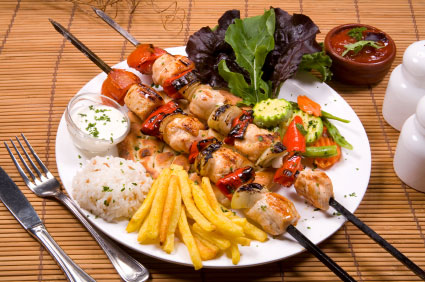It goes without saying that food is the fuel that keeps your body running. If you are tired and run down all the time, you may not have enough fuel in your energy tank.
Not only do you need enough fuel, but you need the right kind of fuel if you want a steady supply of energy to keep you going and to ward of fatigue.
Glucose fills the Tank
However, some foods provide energy faster and more efficiently than others. All foods are made of fats, proteins and carbohydrates.
Some, like fruits and vegetables, are almost all carbohydrate, while others, like meat, cheese and butter have almost no carbohydrates in them. Carbohydrates break down directly into glucose, so they are the best sources of energy.
This is not to say that fats and proteins play no role in providing you with energy. It’s just that carbohydrates do this more quickly.
Still, not all carbohydrates are great choices for energy. There both simple and complex carbohydrates.
While simple carbohydrates (candy, cookies, soda and other white sugar and white flour products) provide a quick boost of energy, the spike is short-lived and you will quickly feel tired again soon after eating them.
It is complex carbohydrates – vegetables, fruits and whole grain products – that provide the steadiest and most reliable source of energy.
Eating for Energy
The best foods you can eat for energy are high in complex carbohydrates while also having a moderate amount of protein and a bit of fat.
Most fat-free foods are simple carbohydrates, and these are the foods you want to avoid.
Protein is also an important nutrient when you are eating for energy because muscles are created from protein, and muscles, of course, make you stronger.
Examples of the kinds of high energy foods that you should emphasize when eating for energy include beans, oats, most vegetables and whole grain breads and cereals. You can also combine foods to create high energy meals.
For example, try
- peanut butter on whole grain bread
- rice and beans
- hummus on whole grain bread
- steamed vegetables with tofu, fish or lean meat served with brown rice
Vitamins and Minerals to keep you Going
There are also several vitamins and minerals to focus on when eating for energy. The top energy nutrients to consider are vitamin C, B complex vitamins and iron.
 Vitamin C is crucial to energy production because it is involved in the creation of carnitine, a substance that helps you burn fat for energy. That means you can use fat for energy more efficiently when your vitamin C levels are not depleted.
Vitamin C is crucial to energy production because it is involved in the creation of carnitine, a substance that helps you burn fat for energy. That means you can use fat for energy more efficiently when your vitamin C levels are not depleted.
Vitamin C-rich foods include citrus fruits, leafy greens, bell peppers, strawberries and cantaloupe.
B complex vitamins are often called the “energy vitamins” because they all play a role in processes that create energy in the body.
The vitamins of the B complex are: B1 (thiamine), B2 (riboflavin), B3 (niacin), B6, pantothenic acid, biotin, B12 and folate (also called folic acid). They are found in a wide variety of foods including beans and whole grains, animal products and vegetables.
Often people who suffer from chronic fatigue find that taking a B complex vitamin supplement can help boost energy levels.
Iron is important because it helps transport oxygen through the blood. Without enough oxygen, you will be exhausted. In fact, a common cause of chronic fatigue is iron deficiency anemia.
Beans and legumes, spinach and meat are good sources of iron that should be included in your daily diet if you are tired all the time.
Keeping the Energy Flowing
Another strategy when you are eating for energy is to eat every few hours. Instead of three full meals, try grazing – the practice of eating five or six mini-meals, one every few hours.
Or you can eat three moderate meals and have a small mid-morning and mid-afternoon snack in between if that works better for you.
The strategy of eating throughout the day will keep your blood sugar and your energy level steady. Even if you stick to the traditional three meals per day, never skip meals, and especially do not skip breakfast!
Many people skip meals, especially if they are trying to lose weight. This strategy will backfire in the long run because it will cause your body to go into “starvation mode” thinking that there is not enough food available. As a result, you will feel exhausted!

